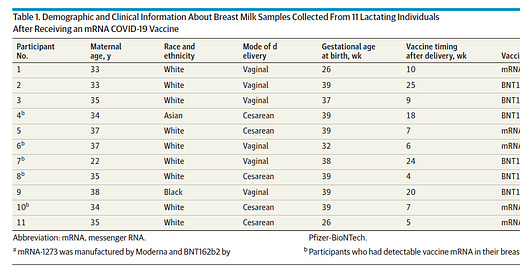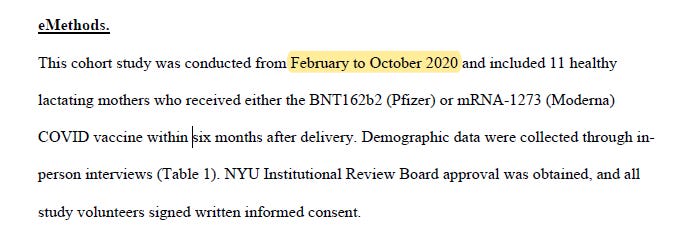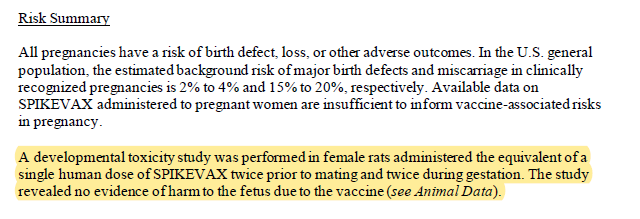COVID-19 Vaccine mRNA now found in breastmilk
And – details on these test results being withheld from the public
A small but groundbreaking study (available here) has been released at the Journal of the American Medical Association (JAMA) Pediatrics, demonstrating that trace amounts of COVID-19 vaccine mRNA were found in the breastmilk of lactating women as soon as one hour after vaccination.
This study was conducted from February to October 2021 (initially reported as February to October 2020; more on that in a moment), and included only 11 lactating women, 5 of whom received the Moderna vaccine and 6 of whom received the Pfizer vaccine. The comparison was made between their pre-vaccine breastmilk (the control) and post-vaccine breastmilk.
The results? The breastmilk of 5 out of 11 women tested had detectable COVID-19 vaccine mRNA in their breastmilk. For those keeping score, that is 45% - nearly half - of the study group.
The mRNA was detected in breastmilk as early as 1 hour after vaccination, and as late as 45 hours after vaccination.
Of course, given the limited sample size, this doesn’t mean that the COVID-19 vaccine mRNA will be absent from breastmilk after 45 hours. We’ve already seen that the spike protein/mRNA can last for months after vaccination . According to one study summarized by Dr. Robert Malone:
the mRNA and the spike protein produced persists for weeks in lymph node germinal centers in human patients. Immunohistochemical staining for spike antigen in mRNA vaccinated patient LNs varied between individuals, but showed abundant spike protein in germinal centers 16 days post-2nd dose, with spike antigen still present as late as 60 days post-2nd dose. Having worked with mRNA for decades, I can attest that this is highly unusual.
Back to the study. According to the authors:
“These data demonstrate for the first time to our knowledge the biodistribution of COVID-19 vaccine mRNA to mammary cells and the potential ability of tissue EVs to package the vaccine mRNA that can be transported to distant cells.”
They speculate that following the administration of a COVID-19 vaccine, “lipid nanoparticles containing the vaccine mRNA are carried to mammary glands via hematogenous and/or lymphatic routes.”
The limitations of this study are unfortunate. There were only 11 participants, and the authors observe there is a “lack of functional studies demonstrating whether detected vaccine mRNA is translationally active.” This means that the safety of post-vaccination breastmilk is unknown.
Despite the lack of evidence demonstrating safety, the authors conclude: “The sporadic presence and trace quantities of COVID-19 vaccine mRNA detected in EBM suggest that breastfeeding after COVID-19 mRNA vaccination is safe, particularly beyond 48 hours after vaccination.”
That conclusion on safety is weakened, if not contradicted, by their own advice:
“caution is warranted about breastfeeding children younger than 6 months in the first 48 hours after maternal vaccination until more safety studies are conducted.”
And what does the study mean by advising “caution”? They fail to provide specifics, but it seems they study’s authors are hinting at stopping breastfeeding for the first 48 hours post-vaccine until more information is available.
Our educated guess is supported by the authors’ conclusions about the lack of safety data, specifically:
They “did not test the possible cumulative vaccine mRNA exposure after frequent breastfeeding in infants.”
“The potential interference of COVID-19 vaccine mRNA with the immune response to multiple routine vaccines given to infants during the first 6 months of age needs to be considered.”
Were these findings hidden from the public?
There’s something else curious about this study. According to its supplement explaining the methodology, the study was “conducted from February to October 2020.”
We previously asked if that information was correct, citing to the “potential for author error” but also the potential that the study might have been suppressed. We suggested that the availability of COVID-19 vaccines for nonclinical trials suggested a later timeline. We now have an answer: the study was conducted from February to October 2021.
This still means the data is nearly one year old. At a time when the public and employees were subjected to wrongful vaccine mandates, it would have been nice for pregnant women to know the risks involved in the shots. One can’t help but to ask if delay can be attributed to the institutional and medical decisions to not contribute to vaccine hesitancy. Unfortunately, publication delays allowed for contrary findings from more limited studies to take-hold and mislead the public about the lack of vaccine mRNA in breastmilk.
FDA/CDC/Big Pharma Promises
It should be no surprise that the findings of this study cast doubt on the promises made by the officials at the FDA and CDC who guaranteed the vaccines were “safe and effective” for pregnant women. Those promises were always questionable, as they are unsupported by the claims of the vaccine manufacturers themselves, who asserted: Available data on COMIRNATY/SPIKEVAX administered to pregnant women “are insufficient to inform vaccine-associated risks in pregnancy.”
It has long been the case that Moderna and Pfizer are less convinced than the CDC/FDA about the pregnant rat studies:
Anyway, in the face of the warning of caution from this latest study and its emphasis on the unknowns of safety data for infants, the CDC still recommends the COVID-19 for women who are breastfeeding:
“CDC recommends COVID-19 vaccines for everyone ages 6 months and older, including people who are pregnant, breastfeeding, trying to get pregnant now, or might become pregnant in the future and getting boosters, if eligible.”
As to Pfizer and Moderna claims about lactation? Both vaccine manufacturers currently say it is “not known” whether their vaccines are “excreted in human milk.”
Based on the results from this latest study, I’m guessing it’s because they didn’t bother to take a look.








So we learn the vaccine doesn't stay put but circulates but we don't know for how long. We really have no idea if the breast milk is safe for infants, but maybe not. The vaccine makers were hesitant about giving the vaccine to pregnant women but our government, for some reason, knows more than the vaccine makers. And we know that any adverse reporting on vaccines was suppressed until recently as the public has already begun to be aware of vaccine issues and are voting their disbelief by not getting their children nor themselves further exposed. One wonders how long this charade can proceed.
Our health officials are found to be naked, finally. I fear the totally of the damage will take years to be recognized.
No, let's be accurate. It was found in lactating "individuals".